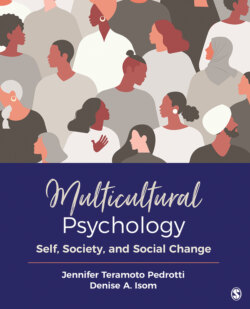Читать книгу Multicultural Psychology - Jennifer T. Pedrotti - Страница 20
На сайте Литреса книга снята с продажи.
The Fourth Force
ОглавлениеAs a field, psychology has a history that involves several different movements or “forces.” In the early days of the creation of the field of psychology, Sigmund Freud and his followers developed theories and practices based around the First Force: psychodynamics. Later, B. F. Skinner and colleagues discussed human actions in the Second Force: behaviorism. Starting with Carl Rogers, Viktor Frankl, and Rollo May, the ideas of existentialism and humanism were termed the Third Force. There is much written about these forces in terms of the way they have shaped the field of psychology, offered explanations, and given evidence for development of different behaviors, cognitions, and emotional reactions. In each of the previous forces, a particular set of theories or explanations was used to decode human behavior. In psychodynamic theory, for example, it is believed that internal drives and interactions within different parts of the mind influence our behavior. Freud’s conceptualizations of the id, ego, and superego depict a constant internal battle between drive and ethics as impacting decisions, development, and emotions. This differs sharply from the theories of Skinner and Watson, who instead believed that all human traits were shaped and molded by external forces of rewards, punishments, or conditioning. Humanism and existential theorists brought forward the idea that the similarity of human conditions (e.g., loneliness, despair, desire) drives behavior. Each of these forces was deemed such after noting the deep impact each set of theories had on our understanding of human behavior, thought, and feelings.
In 1990, a psychologist named Paul Pedersen declared that a new force had emerged in the field, the Fourth Force: multiculturalism. Pedersen was pointing to the idea that culture influenced the way we think, feel, and behave on a daily basis. This is where we are in the field of psychology today. Thus, in keeping with the fourth force, culture must come into play in thinking of any type of development. Cognition, affect, and behavior can all be explained through the lens of cultural forces. Our racial backgrounds, gender identity, socioeconomic status groups, and other facets of our identity determine how we see the world, how we may be similar in some ways, and how we are all distinctly different. Naming multiculturalism as the Fourth Force shows the importance of each of these layers to our development and to our understandings of the world. We are not islands; we are connected to all others and able to make meaning of our surroundings and experiences primarily through our unique and culturally influenced worldview.
